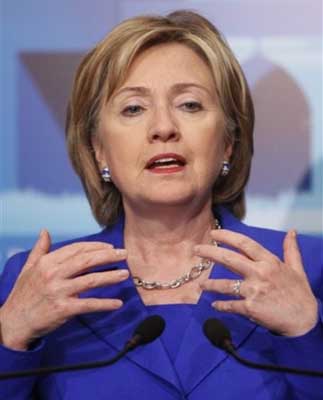Clinton seeks 'meaningful' steps against climate change
 Washington - US Secretary of State Hillary Rodham Clinton called for the development of "meaningful proposals" to combat climate change as she kicked off a two-day international conference in Washington. Warning that the pace of global warming is overrunning even "worst case" scenarios, Clinton said at the State Department Monday that the effort to reduce its effect must take place on national, regional and international levels.
Washington - US Secretary of State Hillary Rodham Clinton called for the development of "meaningful proposals" to combat climate change as she kicked off a two-day international conference in Washington. Warning that the pace of global warming is overrunning even "worst case" scenarios, Clinton said at the State Department Monday that the effort to reduce its effect must take place on national, regional and international levels.
"It took a lot of work by a lot of people to create the problem of climate change over the last centuries, and it will take our very best efforts to counter it," Clinton said.
President Barack Obama has made climate change and the development of clean, renewable energy a top priority for his administration, reversing the perception that the United States has for too long neglected the problem. The United States and China are the world's leading producers of harmful greenhouse gases.
"The United States is no longer absent without leave," Clinton said. "President Obama and I and our administration are making climate change a central focus of our foreign policy."
The conference consists of the top environment officials from the world's 17 leading economies and comes ahead of the major gathering in Copenhagen in December designed to force a new international accord to follow up on the Kyoto Protocol, which expires in 2012.
Obama's goal to aggressively tackle greenhouse gases is already facing resistance from his own Democratic party in Congress, where legislators are debating whether to scale back a far-reaching proposal introduced last month that would boost incentives for renewable energy and for the first time force companies to pay for pollution.
The draft bill echoes Obama's pledge to aggressively tackle greenhouse-gas emissions, lowering them by about 15 per cent by 2020 compared to 2005 levels and 80 per cent by 2050. The European Union is aiming for much sharper cuts with a plan that would reduce emissions by 20 per cent by 2020 compared to 1990 levels.
The Obama legislation would also introduce a cap-and-trade programme, a system that allocates pollution credits to companies and allows them to be swapped on the market between cleaner and dirtier firms.
Since March, however, utility companies have made inroads in Congress in their push to be given 40 per cent of the emission permits for free, and a Democratic counter-proposal in Congress would only reduce emissions by 6 per cent by 2020, the Washington Post reported.
Republicans have derided the measure as a tax on business and a job killer in times of recession.
But Obama could also go around Congress by issuing executive orders through the Environmental Protection Agency (EPA). The EPA opened that possibility by ruling April 17 that that greenhouse gases threaten air quality and public health.
The decision must be submitted for public comment for 60 days before being finalized, and would allow the government to regulate industry emissions of six greenhouse gases, including carbon dioxide, under existing clean air laws without additional congressional approval.
The White House has indicated it would prefer to reach a deal with Congress. The State Department's special envoy for climate change, Todd Stern, emphasized last week the importance of the United States reaching consensus within its own border before entering broader international negotiations.
"We don't want a repeat of a situation where we sign a lovely agreement in some foreign capital and not have it approved back here," told reporters.
Former president Bill Clinton signed the Kyoto Protocol in 1997, but facing stiff resistance in Congress, never submitted it for ratification. Obama's predecessor, George W Bush, withdrew from Kyoto and until late in his administration, downplayed the threat of global warming.
Bush also argued that Kyoto put US companies at a disadvantage internationally and insisted that underdeveloped countries like China and India agree to the same standards as developed nations.
India and China are among the countries participating in the gathering in Washington. The other countries and organizations are: Australia, Britain, Brazil, Canada, France, Germany, the European Union, Indonesia, Italy, Japan, South Korea, Mexico, Russia and South Africa. The United Nations and Denmark attended as observers and will be hosting the December meeting. (dpa)